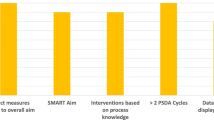Opinion statement
Quality improvement (QI) methodologies allow healthcare systems to improve the quality of care delivered to patients. Teaching trainees about these concepts and tools is now a required component of residency training. QI training in pediatric residency programs is generally well-accepted and feasible, and many programs include a project component that can effect change in clinical processes; however, there is lack of agreement on best practice standards for training residents in terms of content, format, and assessment. For example, though pediatric residents are generally satisfied with their QI training, one survey found that many did not use basic QI tools during their project design, implementation, and analysis. The majority of pediatric program directors note that a QI curriculum exists in their program but the formats vary; as opposed to residents, only 23% are satisfied with their current program. Additionally, some programs do not use a formal evaluation process to study and improve their curriculum. Innovations in teaching QI, such as focused residency tracks and faculty-resident co-learning, are exciting, but the priority must be creation of a standardized set of learning objectives for trainees. Barriers to successful QI training include lack of faculty expertise and cultural factors, such as misaligned values between the institution, GME, and/or residents. An emphasis on the scholarly output possible from QI projects may help assuage doubts for those who initially do not see the value of QI-based improvements.

Similar content being viewed by others
References and Recommended Reading
Papers of particular interest, published recently, have been highlighted as: • Of importance •• Of major importance
Mangione-Smith R, Decristofaro AH, Setodji CM, et al. The quality of ambulatory care delivered to children in the United States. N Engl J Med. 2007;357:1515–23.
Accreditation Council for Graduate Medical Education milestones: http://www.acgme.org/Portals/0/PDFs/Milestones/PediatricsMilestones.pdf.
CanMEDS: http://canmeds.royalcollege.ca/uploads/en/framework/CanMEDS%202015%20Framework_EN_Reduced.pdf.
American Board of Pediatrics: https://www.abp.org/content/maintenance-certification-moc.
Co JPT. Educating for quality: quality improvement as an activity of daily learning to improve educational and patient outcomes. Acad Pediatr. 2014;14(1):1–3.
Moses J, Shore P, Mann KJ. Quality improvement curricula in pediatric residency education: obstacles and opportunities. Acad Pediatr. 2011;11(6):446–50.
Clinical Learning Environment Review: http://www.acgme.org/What-We-Do/Initiatives/Clinical-Learning-Environment-Review-CLER.
Wong BM, Etchells EE, Kuper A, Levinson W, Shojania KG. Teaching quality improvement and patient safety to trainees a systematic review. Acad Med. 2010;85(9):1425–39.
• Mann KJ, Craig MS, Moses JM. Quality improvement educational practices in pediatric residency programs survey of pediatric program directors. Acad Pediatr. 2014;14(1):23–8. This article helps describe the state of QI education for pediatric trainees via results of a survey of Pediatric Program Directors.
• Craig MS, Garfunkel LC, Baldwin CD, Mann KJ, Moses JM, Co JPT, et al. Pediatric resident education in quality improvement (QI) a national survey. Acad Pediatr. 2014;14(1):54–61. This article helps describe the state of QI education for pediatric trainees via results of a survey of resident perceptions.
Courtlandt C, NoonanLaura K, Maureen W, Zeskind PS, Mabus S, Feld L. Pediatrics residents confidence and performance following a longitudinal quality improvement curriculum. J Grad Med Educ. 2016;8(1):74–9.
Shaikh U, Natale JE, Nettiksimmons J, Li TT. Improving pediatric health care delivery by engaging residents in team-based quality improvement projects. Am J Med Qual. 2013;28(2):120–6.
Gupta M, Ringer S, Tess A, Hansen A, Zupancic J. Developing a quality and safety curriculum for fellows lessons learned from a neonatology fellowship program. Acad Pediatr. 2014;14(1):47–53.
Glissmeyer EW, Ziniel SI, Moses J. Use of the quality improvement (QI) knowledge application tool in assessing pediatric resident QI education. J Grad Med Educ. 2014;6(2):284–91.
Doupnik SK, Ziniel SI, Glissmeyer EW, Moses JM. Validity and reliability of a tool to assess quality improvement knowledge and skills in pediatrics residents. J Grad Med Educ. 2017;9(1):79–84.
Bonnes SL, Ratelle JT, Halvorsen AJ, Carter KJ, Hafdahl LT, Wang AT, et al. Flipping the quality improvement classroom in residency education. Acad Med. 2017;92(1):101–7.
Wong BM, Goldman J, Goguen JM, Base C, Rotteau L, Van Melle E, et al. Faculty-resident co-learning a longitudinal exploration of an innovative model for faculty development in quality improvement. Acad Med. 2017;92(8):1151–9.
Patel N, Brennan PJ, Metlay J, Bellini L, Shannon RP, Myers JS. Building the pipeline the creation of a residency training pathway for future physician leaders in health care quality. Acad Med. 2015;90(2):185–90.
Butler JM, Anderson KA, Supiano MA, Weir CR. "it feels like a lot of extra work": resident attitudes about quality improvement and implications for an effective learning health care system. Acad Med. 2017;92(7):984–90.
•• Philibert I, Del Rey G, Javier A, Lannon C, Lieh-Lai M, Weiss KB. Quality improvement skills for pediatric residents from lecture to implementation and sustainability. Acad Pediatr. 2014;14(1):40–6. This article provides recommendations from the ACGME and an example of effective QI education for trainees via active resident participation.
Author information
Authors and Affiliations
Corresponding author
Ethics declarations
Conflict of Interest
Kristina Toncray declares that she has no conflict of interest.
Human and Animal Rights and Informed Consent
This article does not contain any studies with human or animal subjects performed by any of the authors.
Additional information
This article is part of the Topical Collection on Quality Improvement
Rights and permissions
About this article
Cite this article
Toncray, K.A. Quality Improvement Education for Pediatric Residents and Fellows. Curr Treat Options Peds 3, 374–385 (2017). https://doi.org/10.1007/s40746-017-0106-8
Published:
Issue Date:
DOI: https://doi.org/10.1007/s40746-017-0106-8




